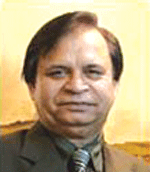 PPP is most essential to bring in quality in the higher education system. Governments can ensure PPP through an appropriate policy. However, PPP should not impose academic restrictions
PPP is most essential to bring in quality in the higher education system. Governments can ensure PPP through an appropriate policy. However, PPP should not impose academic restrictions
Dr Rajendra Prasad
Rector & Professor, School of Life Sciences, Jawaharlal Nehru University
What are the challenges confronting India`s higher education system today?
Some of the leading challenges before the higher education system are continuous upgradation of curriculum to keep in pace with rapid growth of science and technology; globalisation and the resultant challenges from the international universities; grooming of many private institutions without any method of ensuring maintenance of quality and standard; need for adequate funding to meet the demands of various novel innovative programmes; developing a meaningful and purposeful inter-face between the universities, National Research Laboratories, industries, government and society, etc.
ICT in higher education policy may not be able to completely overcome all these challenges though it may play a role in information and resource sharing.
What initiatives have been taken by your university for integrating ICT in its framework?
Jawaharlal Nehru University set up a Communication and Information Services (CIS) in the year 1997 to facilitate communications-wide networking. As of now, there are 20 academic buildings integrated through Fiber Optic Cable back bone of 1 Gbps bandwidth. In addition, four buildings are integrated through wireless connectivity and there are more than 2000 network connections. The network is being used for different academic purposes such as web access of other academic institutions, e-mail, on-line journals, and video conferencing and also for e-governance.
Do you think Public- Private Partnership model will help in effective integration of technology in higher education?
PPP is most essential to bring in quality in the higher education system. Governments can ensure PPP through an appropriate policy. However, PPP should not impose academic restrictions. University Grants Commission and Ministry of HRD should play a major role in developing a purposeful interface between the Universities, Industries and National Research Laboratories (NRLs) as a step towards PPP. Funding to NRLs by the government should ensure the involvement of institutions of higher education engaged in research activities to facilitate availability of latest sophisticated equipment.
Please tell us about the JNU`s recent Memorandum of Understanding (MoU) and Agreement of Cooperation (AoC) with two universities from Germany and United Kingdom.?
JNU has entered into an AoC with the University of Cologne in Germany. Initially, the cooperation is going to be in the areas of Tamil Studies and German Studies with possibility of expanding to other areas. JNU has also entered into an MoU with Queen`s University, Belfast, UK with cooperation focusing on social sciences, especially in GAS and Geography and also Biotechnology. Under these collaboration, research students of JNU, depending upon the research topic, will be in a position to spend some period in these respective institutions to facilitate their Ph.D work.
Students go abroad after completing Ph.D. for post-doctoral studies. The retention capacity is low in India and this has to be enhanced. What is your observation on this?
The international recognition of any institution is achieved due to high quality of teaching and research. In India, there are not many opportunities for post-doctoral research work in the university system. UGC and MHRD should be providing specific funding for the creation of large number of post-doctoral research fellowship so that best students can look for these institutions for advance research. Some of the other requirements for retaining talent in India are quality infrastructure and facilities, well equipped laboratories with sustained financial support for consumables and also periodic upgradation of equipment.





















